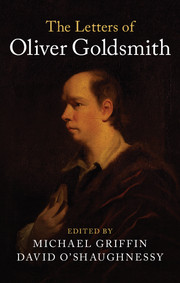29 - To Maurice Goldsmith, [London, c. 10 January 1770]
Published online by Cambridge University Press: 12 December 2024
Summary
Maurice Goldsmith (1736?–94?) was Goldsmith's younger brother. Maurice lived with his cousin Jane Lawder, and her husband James, for a period in Kilmore, Co. Roscommon, as this letter indicates. He appears to have lacked a fixed direction in life and Goldsmith declined to take him on a planned trip to India in 1758. Instead, he offered to find him some employment in London, provided he ‘would accustom himself to write and spell’ (Letter 11). The situation does not seem to have ameliorated between then and the date of this letter. However, Percy reveals that Maurice followed Goldsmith's advice to find a trade and apprenticed himself to a cabinet-maker. He eventually opened a shop in Dublin where the Duke of Rutland appointed him inspector of licences during his tenure as lord lieutenant of Ireland in 1784–7. This was apparently done at the suggestion of his chief secretary Thomas Orde Powlett, later Lord Bolton, ‘out of regard to his brother’s memory’ (Percy, ‘Life’, 87). He was also appointed mace-bearer to the Royal Irish Academy. When Goldsmith died, Maurice travelled to London but to no material benefit, although he wrote a courteous letter of thanks to William Hawes who had attended his brother on his deathbed.
In this letter below, Goldsmith informs his brother that, although he has been appointed to the Royal Academy and maintains an illustrious London acquaintance, he is not in a position to offer much by way of direct financial support. Insofar as a small legacy is concerned, however, Goldsmith happily waives any claim. It appears that Maurice was not slow to act on his brother's decision: his receipt for this transferred legacy is written on the back of the address page, the money thus hastily secured:
Received from Jams. Lawder Esqr fifteen pounds Sterl. ye which sum is in full of a Legacy bequeathed to my Brother Oliver Goldsmith by ye last will and Testament of ye Revd Mr Thos Contrine I say received ye same by Virtue of ye within power given to me by my sd. Brother Oliver Goldsmith. Wittness my hand this twenty fourth day of February 1770 seventy. | Maurice Goldsmith. | Wittness prsent. | Will: Hodson. | 13 Gue … 14.15.9 | change … 4.3 | |15.0.02
- Type
- Chapter
- Information
- The Letters of Oliver Goldsmith , pp. 80 - 83Publisher: Cambridge University PressPrint publication year: 2018

